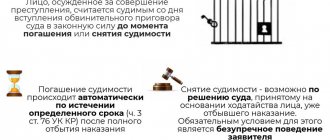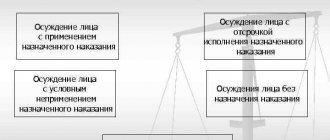A criminal record presupposes a certain social and legal status of a convicted person who committed a criminal offense for which a sentence was passed. Being in the status of a convicted person, a person is potentially dangerous to society, therefore the presence of such status entails some legal restrictions. The fact of a criminal record comes into force immediately after the verdict is announced at a court hearing and ends with its liquidation or expungement in accordance with Article 86 of the Criminal Code.
Multi-channel free hotline Legal advice on criminal law. Every day from 9.00 to 21.00
Moscow and region: +7 (495) 662-44-36
St. Petersburg: +7 (812) 449-43-40
Under what conditions does a citizen not acquire the status of a convicted person?
- Guilt was proven, but no punishment was imposed in court for the following reasons:
- due to the expiration of the statute of limitations for issuing punishment for this offense;
- avoidance of punishment under amnesty;
- the age of the defendant is under 18 years when committing a crime of minor gravity;
- Persons who are exempt from punishment:
- when circumstances change, when the crime committed loses its social danger. For example, if a citizen who does not have an official permit to provide medical care in a private medical practice causes harm to a person’s health through negligence. Moreover, the permission he received occurred before the sentencing, so the content of the crime loses its force and is transferred to the rank of offenses under the Administrative Code. In connection with all these circumstances, the court exempts the citizen from punishment under the Criminal Code;
- recognition of the fact of mental incapacity or the presence of another serious somatic illness that manifested itself after the fact of the crime committed. If an improvement in well-being has occurred, and the term of the charge has not yet expired, a penalty will be applied to the convicted person in accordance with the article of the Criminal Code, that is, he will be officially found guilty. After this, the expungement or expungement of a criminal record is carried out in accordance with the general procedure;
- upon receipt of a deferment on the imposition of a penalty if the offender has children under the age of 14 years. We are talking about the category of persons, the list of which is presented in Art. 82 of the Criminal Code: pregnant women; persons raising children under 14 years of age without a spouse (single fathers and mothers).
This is not a complete list of reasons that constitute grounds for avoiding punishment. In each individual case, a decision can only be made in court.
Restrictions related to criminal record
The presence of an outstanding (expunged) criminal record not only implies a restriction of rights, a ban on performing a certain type of work, but also affects the severity of the punishment when committing another crime:
ban on traveling outside the country, refusal to acquire citizenship, nomination for elected positions, or issuance of hunting and weapons permits;- prohibition on holding positions related to financial responsibility, teaching work, state and equivalent service, advocacy, access to government. secrets;
- When committing another offense, having a criminal record is considered an aggravating circumstance and entails a more severe punishment.
You can find out about the presence (absence) of a criminal record at the information and analytical center of the Ministry of Internal Affairs of the Russian Federation. To do this, you need to contact in person or through a representative acting under a notarized power of attorney, the center division at the place of actual location or registration. You can also find out such information through the single Internet portal “State Services”.
In addition to the person himself or his authorized representative, information about the presence (absence) of a criminal record is issued upon official requests from authorized state bodies.
Legal restrictions on criminal status
The fact of a criminal record provides for certain conditions and restrictions in the criminal and general legal and penal sense. This status of a citizen is taken into account when assessing repeated criminal acts under the same article. Then the punishment will be more serious. Also, the status of a convicted person limits a citizen’s rights to engage in certain types of professional activity, to occupy important positions and positions (judicial or customs authorities, prosecutor’s office, etc.), as well as the right to obtain citizenship, guardianship rights, the possibility of adoption, etc. An outstanding criminal record deprives opportunity to leave your country.
When does a criminal record occur and what are its consequences?
A criminal record arises at the moment when a court's guilty verdict comes into force.
And it lasts for a certain period of time, which is often years. A criminal record leaves an imprint on the work activity of citizens, prohibiting them from:
- hold certain positions in the civil service, judicial and law enforcement agencies;
- work in the field of teaching activities that involve raising minor children;
- work in the legal profession;
- hold leadership positions in the financial sector;
- work in aviation security services;
- carry out activities in certain areas, for example detective and security.
There are other restrictions, depending on the type of crime committed. For example, citizens with a criminal record do not have the opportunity to:
- stand for election and be elected to state authorities and local councils, if the criminal record has not been cleared by election day;
- obtain a hunting license and a weapons license;
- to be guardians and adoptive parents (if this is a conviction for crimes against the person), etc.
Important: if there is a valid, that is, unexpunged and outstanding criminal record, the citizen is obliged to indicate this when filling out some official documents in various authorities.
The negative consequences that a criminal record causes can also have a criminal nature, which manifests itself in the following:
- if another crime is committed, the presence of a criminal record will be reflected in the court verdict, which will lead to a more severe punishment (Articles 63, 68 of the Criminal Code of the Russian Federation);
- a criminal record also plays a role when assigning a convicted person a correctional facility (Articles 58, 83 of the Criminal Code of the Russian Federation);
- limits the use of amnesty and suspended sentences (Articles 75–76.1 of the Criminal Code of the Russian Federation);
The above consequences emphasize that a criminal record (expungement and expungement of a criminal record in particular) plays a significant role in the implementation of the constitutional rights of a citizen.
Conditions for expunging a criminal record
Clearance of a criminal record can be achieved in two ways - through expungement and through withdrawal. Both of these options involve the removal of all imposed restrictions and his full restoration of his rights. At the same time, this does not imply that when expunging or removing a criminal record, the fact of its existence in the past is not taken into account when imposing a penalty if the citizen is charged under the same criminal article or another again. If there is more than one criminal offense, the term of serving the sentence is calculated for each of them.
What is a criminal record?
A criminal record is a kind of stamp that is placed on a citizen convicted of committing a particular crime.
It includes a set of restrictions regarding the inability to leave a certain place, continue to commit illegal actions, as well as other types of prohibitions. Sometimes the obligation to undergo permanent registration with specialized bodies is also included.
The main regulator of this issue is Art. 86 of the Criminal Code of the Russian Federation. It specifies the rules for removing this burden, cases when it is not imposed, and other important provisions.
Thus, in accordance with the norms of this article, we can highlight the principles that define this legal concept:
- exemption from restrictions if the state refuses to punish the person;
- lifting restrictions only within the time limits and according to the rules established by law;
- early removal of encumbrances imposed by public authorities, subject to correct behavior and compliance with other conditions.
The concept of “expunged criminal record”
The expungement of a criminal record occurs immediately after a specific period has passed, in accordance with the law. This does not require a special decision from the court. When receiving a suspended sentence, the period of criminal record is absolutely similar to the assigned probation period.
If a suspended conviction is expunged, the citizen is released from the status of a convicted person. In other cases, the total term of all convictions and serving the sentence, as well as an additional one, if one was assigned, is calculated. It is determined by the period when a citizen is under special control after his release, which is determined depending on the severity of the act committed.
In the event that the convicted person has not been punished due to any circumstances beyond his control, he is considered not to have been convicted after the statute of limitations for the implementation of the sentence has expired.
Conditional conviction
Conditional sentencing is a measure of a criminal law nature, which consists in establishing for a convicted person, whose correction can be achieved without actually serving the sentence, a probationary period during which the convicted person must prove his correction. At the same time, his behavior will be monitored by a special government body, and he may be assigned additional responsibilities to facilitate his correction.
If during the probationary period the convicted person evades control and fulfillment of the duties assigned to him, commits offenses or crimes, the suspended sentence may be revoked, after which the assigned punishment will begin to be actually executed. At the end of the probationary period or if, before the expiration of the probationary period, the conditionally convicted person has proven his correction by his behavior, the restrictions on the convicted person are lifted, and the criminal record is expunged.
Procedure for calculating criminal records upon early release
When released from punishment before its official completion or as a result of changing the remaining term to a less severe measure, the remaining part of the term initially announced by the court is not included in the total term of the criminal record. This means that the duration of serving the sentence established by the Criminal Code is counted from the time when it was directly completed.
The duration of this period is assigned according to the measure initially specified in the text of the court decision. For example, after a certain period of punishment for criminal acts of not very serious gravity, part of the total sentence can be changed to a more lenient measure in the form of correctional labor. Thus, the entire term after serving the sentence will not be equal to 1 year if correctional labor had been assigned, but 3 years, that is, the period provided for a not very serious crime.
Why is a criminal record dangerous?
An “open” criminal record entails a lot of negative consequences for a person:
- closes the road to certain professional fields (security, detective, aviation, financial, legal, pedagogical, government and law enforcement);
- interferes with obtaining citizenship of another country;
- prohibits them from being trustees, guardians or adoptive parents;
- limits the possibility of participating in elections in the form of a ban on running for elected office;
- does not allow him to serve in the armed forces.
If a citizen intentionally or carelessly commits a new crime, and the previous conviction has not been expunged, the court will be as harsh as possible with the offender. He will be given a more severe punishment and placed in a correctional facility with more “strict” conditions. Also, “double” conviction may cause the offender not to be eligible for amnesty.
In addition to canceling the status of a convicted person, we recommend that you familiarize yourself with the procedure for terminating a criminal case. You will be able to find out how the completion of a criminal investigation affects the status of the perpetrator.
Deadlines for expungement and expungement of criminal records for minors
For everyone who violated the law before coming of age, much shorter terms for expunging a criminal record are assigned, according to Art. 95 of the Criminal Code.
| Preventive measure | Length of criminal record after serving sentence (years) | |
| Lighter than imprisonment | 6 months | |
| Imprisonment for a crime | Light to moderate | 1 |
| Severe or especially serious | 3 | |
Conviction for criminal acts that were committed before the age of 18 does not in any way affect the determination of the sentence if the citizen was prosecuted again. For other conditions, the general paragraphs of Article 86 of the Criminal Code are valid.
The concept of “expunged criminal record”
The concept of expungement of a criminal record means its early cancellation due to a special decision by the court. This is the main difference between a conviction that has been expunged and an expunged conviction. This option is possible if the following conditions are met:
- a presidential decree on pardon was issued;
- release under amnesty, the act of which is adopted by the State Duma;
- through the appeal of the convicted person or the inspector of the correctional service to the court with a petition to remove the criminal record.
Conditions under which a request to expunge a criminal record is granted
There is a high probability that the judge will expunge the criminal record ahead of the term imposed by the court verdict under the following conditions:
- if the convicted person was sentenced to a suspended measure of restraint in the form of imprisonment,
- when serving more than half of the sentence imposed by the court,
- if the convicted person confirms with his achievements moral correction. This includes responsible behavior, full compensation for all damage caused to persons injured as a result of his crime, as well as the complete absence of misconduct.
It is noteworthy that the convicted person’s own initiative to submit a petition to the court is quite rare. Apparently, this proves that there is a narrow understanding of what the difference is between an expunged and expunged criminal record in the Russian Federation.
Criminal record and criminal legal consequences
The legal consequences caused by a person’s criminal record may include the following circumstances:
- A criminal record as a fact that aggravates the legal situation.
- Criminal record as a reason for refusal of employment.
- Repeated convictions as a basis for recognizing a person as a repeat offender.
- The influence of a second conviction on determining the type of correctional institution for a defendant who is sentenced to an actual term of imprisonment.
Procedure for expunging a criminal record
The expungement of a criminal record occurs in accordance with Article 400 of the Criminal Procedure Code. The procedure is as follows. The convicted person submits a petition to the judicial authority or to the district office of the magistrate at his place of residence. He attaches evidence of his correction in the form of documentary evidence to the petition. In this case, the prosecutor can participate in the judicial process of considering the petition of the convicted person. The author of the petition must be present at this process.
Only a court can make a decision to expunge a criminal record or refuse to accept an application. If it is rejected, then the next initiative to submit it may not be earlier than 1 year later.
Contents of the application
According to the law, there is no universal form for filing a petition to expunge a criminal record. In general, it should include some general information:
- information about the applicant, registration address, contact phone number;
- address and details of the place where the sentence is served;
- article of the crime committed;
- a note about impeccable behavior on the part of the convicted person from the time the verdict was announced;
- arguments and conditions under which a court decision can be made in favor of the author of the petition. This could be the start of studies at an educational institution or work, registration of marriage, the birth of a child, the presence of a serious somatic illness, etc.;
- a clearly formulated text of the petition itself for the possibility of expunging a criminal record;
- list of additionally attached documents;
- date of filing the application, signature of the author.
Sample petition to expunge a criminal record.doc
List of additional documents attached to the application
- copies of the verdict (certified) and the decision of the higher court;
- a document indicating the length of the sentence already served;
- arguments described in one’s own hand by close relatives, neighbors, co-workers, etc.;
- characteristics from the educational institution in which the convicted person is a member or from his place of work, etc.;
- copies of certificates of awards and incentives, if any;
- a document from the local police officer at the place of registration, which confirms the absence of claims against the convicted person;
- documentary evidence of the absence of new offenses for the entire past period of punishment;
- medical report on the presence of a serious disease (if any);
- a document confirming compensation for damage to all victims if any was caused.
During the consideration of the petition, the court may also request other documents or certificates.









